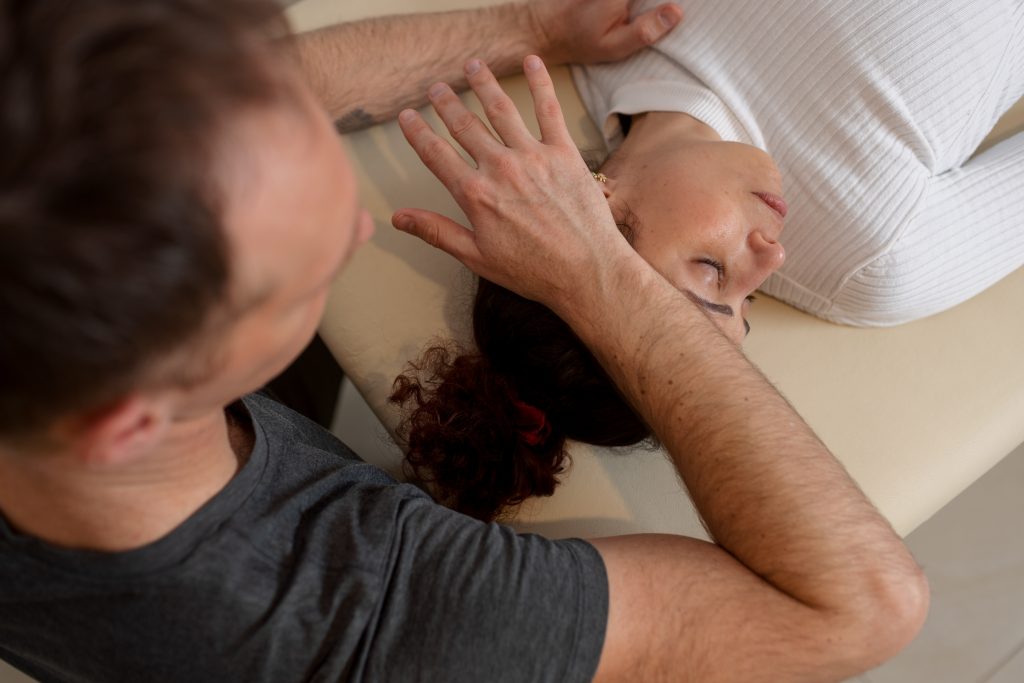Fascial Stretch Therapy (FST)

Fascial Stretch Therapy is now available in Birmingham, Alabama. Brandon is offering sessions at Aero Joe Pilates studio.
Fascial Stretch Therapy (FST) is a unique form of stretching that focuses on the layer of connective tissue between your skin and muscles, called fascia.
Many clients prefer FST to massage: its benefits are faster, less painful, and longer lasting. Personal experience and scientific studies have proven its effectiveness!
What is a Fascial Stretch Therapy Like?
Fun! You’ll lie on the table while the practitioner moves your body. Sometimes you’ll give some small resistance to deepen the stretch.

The practitioner will support your limbs with his shoulder, arms, hip and so forth. It looks a bit like a dance. We can put some music on if you like!
Unlike traditional stretching, which focuses on specific muscles, Fascial Stretch Therapy stretches longer lines across your body. We find the perfect position to open up those hard to reach places.
FST gradually increases your range of movement. It actually feels good, even as you go to the limits of your range of motion.
Who Needs Fascial Stretch Therapy (FST)?
Fascial stretching is great for these conditions:
- shoulder pain
- neck pain
- lower back pain
- difficulty sleeping
- tight hamstrings
- runner’s knee
I have helped many clients with these and other conditions. There is even evidence (see below) that fascial stretching helps with all-body conditions like fibromyalgia.
Please note that if you are in acute pain, you need to be ”cleared to move” by your physiotherapist or physician.
Why Fascial Stretch Therapy?
- Feels great!
- Increases blood flow
- Decrease pain
- More flexibility
- Sleep better
Supported by Research!
- Fascial stretching decreases pain, which addresses a major cause of depression
- Fascia is being researched as a factor in fibromyalgia
- Fascia has more receptors for pain and body-placement than skin
Does Fascial Stretch Therapy Hurt?
Nope! Fascial Stretch Therapy (FST) works under the principle that a muscle has to feel safe to allow a stretch to happen. So we don’t move you into positions that are painful.
In fact, FST actually feels good. Many clients prefer it to massage just based on that! (But of course you’re also getting the benefits of full-body stretching along with that pleasure.)
You CAN try this at home!
Here are some tutorials so you can try some solo stretches at home. You can experience how fascial stretching accesses large nets across your body, not just individual muscles.
For more detailed tutorials for the floor exercises, click here.
Is FST good for Athletes?
Fascial Stretch Therapy is great for athletes for injury prevention and recovery (after you’re cleared for movement or referred by PT). But don’t take our word for it:
What is Fascia?
Fascia is another word for connective tissue. It runs all through your muscles and even to the muscle’s connection to bones.
Fascia can get bound up like a tight shirt that makes your chest feel constricted and restricts your arm movement. Fascial Stretch Therapy does is to slowly stretch and loosen that shirt a bit so you can breathe and move more easily.
Here’s a great illustration of what tight, bound fascia can do to you (and the relief you can feel after fascia stretching!):
It can be considered and application of Anatomy Trains Structural Integration to enhancing and increasing movement.
So, although it’s called “stretching,” this does a lot more for you than let you kick your leg higher. Instead, FST aims to better integrate your mind and body.
Frequently Asked Questions
Fascial Stretch Therapy (FST) is a form of stretching where the client is generally passive on a table. The practitioner slowly, carefully moves you into positions right at the end of your range of motion.
Unlike traditional stretching methods, FST focuses on long fascial nets that cross individual muscles.
No, it doesn’t hurt. It actually feels good. However it is very successful at increasing your range of motion and can help with a number of painful conditions.
Many studies have shown that stretching directly before exercise decreases a muscle’s ability to contract, which can negatively impact your performance.
However, a Fascial Stretch Therapist who is trained in the highest level of FST – i.e., Sport-Specific FST – can provide the perfect invigorating, centering fascial stretch therapy.
Yes! Hypermobile people and those with injuries should see a practitioner who is certified Level 2 or 3. This is because hypermobile people often need stability more than mobility. We also find that hyper-mobile people usually have compensatory tightness, which we can dive into.
Generally, yes. If you are clear for movement following a surgery or diagnosis, you can get FST. Depending on the skill level of the practitioner, you may get different treatment.
A Level 1 FST practitioner should work very gently in the effected area or avoid it. You may find pain relief in the lower back from work on the feet or neck, so avoiding the impacted area can be a good thing.
Practioners at Level 2-3 are equipped to work with many injuries and pathologies once you are cleared for movement.
FST was created by Ann and Chris Frederick. They also lead that workshops to train practitioners.
